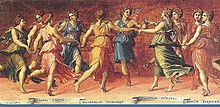Muses
a goddess of the inspiration of literature, science and the arts
The Muses in Greek mythology are goddesses who inspire the creation of art. The word "muse" has also often become poetically applied to actual women who have inspired creative endeavors.

- "Muse" redirects here. For the band, see Muse (band).
Quotes
editAlphabetized by author
- The ancient Greek "oral poets" all had this anxiety about the deficiencies of their memories and always began poems by praying to the muse to help them remember. The invocation of the muses may have been a purely formal element by the time we encounter it, but it very likely reflected a real sense of the anxiety that the memory of forgetting could induce in a sensitive artist of an "oral society."
- David Antin, in A Conversation with David Antin (2002) by David Antin and Charles Bernstein, p. 52
- The Muses are turned gossips; they have lost
The buskined step, and clear high-sounding phrase,
Language of gods. Come, then, domestic Muse,
In slip-shod measure loosely prattling on,
Of farm or orchard, pleasant curds and cream,
Or droning flies, or shoes lost in the mire
By little whimpering boy, with rueful face—
Come, Muse, and sing the dreaded washing day.- Anna Laetitia Barbauld, "Washing Day"
- CLIO, n. One of the nine Muses. Clio's function was to preside over history -- which she did with great dignity, many of the prominent citizens of Athens occupying seats on the platform, the meetings being addressed by Messrs. Xenophon, Herodotus and other popular speakers.
- Ambrose Bierce, The Cynic's Dictionary (1906); republished as The Devil's Dictionary (1911).
- Whether on Ida’s shady brow
Or in the chambers of the East,
The chambers of the Sun, that now
From antient melody have ceas’d;Whether in Heav’n ye wander fair,
Or the green corners of the earth,
Or the blue regions of the air
Where the melodious winds have birth;Whether on chrystal rocks ye rove,
Beneath the bosom of the sea,
Wand’ring in many a coral grove,
Fair Nine, forsaking Poetry!How have you left the antient love
That bards of old enjoy’d in you!
The languid strings do scarcely move!
The sound is forc’d, the notes are few!- William Blake, "To the Muses", in Poetical Sketches (1783)
- To feed your Muse, then, you should always have been hungry about life since you were a child. If not, it is a little late to start.
- Ray Bradbury, in Zen in the Art of Writing (1992), p. 45
- On a hill there growes a flower,
Faire befall the dainty sweete:
By that flower there is a Bower
Where the heavenly Muses meete.- Nicholas Breton, "A Pastorall of Phillis and Coridon"
- England’s Helicon (1600)
- When inspiration does not come, I go for a walk, go to the movie, talk to a friend, let go... The muse is bound to return again, especially if I turn my back!
- Judy Collins, as quoted in Wise Highs: How to Thrill, Chill, & Get Away from It All Without Alcohol or Other Drugs (2006) by Alex J. Packer, p. 213
- Their name, their years, spelt by th’ unletter’d muse,
The place of fame and elegy supply:
And many a holy text around she strews,
That teach the rustic moralist to die.- Thomas Gray, "Elegy written in a Country Churchyard"
- Inspiration is the windfall from hard work and focus. Muses are too unreliable to keep on the payroll.
- Helen Hanson, in "For Writers" (14 July 2010)
- It is through the Muses and far-shooting Apollo that there are singers and harpers upon the earth; but princes are of Zeus, and happy is he whom the Muses love: sweet flows speech from his mouth. For though a man have sorrow and grief in his newly-troubled soul and live in dread because his heart is distressed, yet, when a singer, the servant of the Muses, chants the glorious deeds of men of old and the blessed gods who inhabit Olympus, at once he forgets his heaviness and remembers not his sorrows at all ; but the gifts of the goddesses soon turn him away from these.
- Hesiod, Theogony (c. 700 BC)
- H.G. Evelyn-White, transl., Hesiod, the Homeric Hymns and Homerica (1920)
- The soft, lute-finger’d Muses chaunting clear,
- John Keats, "Lamia", Part I
- The mother of the Muses, we are taught,
Is Memory: she has left me; they remain,
And shake my shoulder, urging me to sing
About the summer days, my loves of old.- Walter Savage Landor, "Memory" (1863)
- There is no place for grief in a house which serves the Muse.
- Sappho (c. 600 BC)
- O! for a muse of fire, that would ascend
The brightest heaven of invention!
A kingdom for a stage, princes to act,
And monarchs to behold the swelling scene!- William Shakespeare, opening chorus of Henry V
- I see Calliope speede her to the place,
Where my Goddesse shines:
And after her the other Muses trace,
With their Violines.
Bene they not Bay braunches, which they doe beare,
All for Elisa, in her hand to weare?
So sweetely they play,
And sing all the way,
That it a heaven is to heare.- Edmund Spenser, "A Ditty / In praise of Eliza, Queen of the Shepherds"
- The Shepheardes Calender (1579)
- Who knows where inspiration comes from. Perhaps it arises from desperation. Perhaps it comes from the flukes of the universe, the kindness of the muses.
- Amy Tan, as quoted in A Small Drop of Ink : A Collection of Inspirational and Moving Quotations of the Ages (2003) by Linda Pendleton, p. 129
- I have always believed that opera is a planet where the muses work together, join hands and celebrate all the arts.
- Franco Zeffirelli, as quoted in International Herald Tribune (21 March 1990), and The Columbia Dictionary of Quotations (1983) by Robert Andrews, p. 651